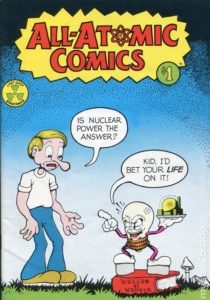EduComics
Listen to the Recess! Clip
| Author | Stephanie Boluk |
| Air Date | 11/30/2006 |

EduComics Transcript
“It takes practice to learn to ignore the news.” This is what the apathetic father of a young girl trying to figure out the cause of global famine says when she asks him why people go hungry. Unsatisfied by this reply, the girl sets out to seek an answer to her question. What she discovers, to her surprise, is that food shortages are not the reason people go hungry. This story takes place in the educational comic book Food First Comics. It was created by Leonard Rifas who has run his one-man publishing house, EduComics, since the 1970s.
For more than thirty years, he has created comics that are intended to engage and inform on a wide range of international and environmental issues from sustainable energy to nutrition. Rifas’s clear, well-documented comics are well-researched investigations of subjects of pressing current concern. His works guide readers through challenging issues and often feature young, curious protagonists struggling to find answers to their questions.
Rifas takes advantage of the medium of comics to clearly convey difficult subject matter while encouraging critical thinking on the part of his readers whose interests in these topics will, Rifas hopes, take them beyond the panel borders of his comics. On the cover of a comic titled All Atomic Comics, a young boy poses the question “Is nuclear power the answer?” to the unscrupulous character named Greedy Killerwatt, an industrialist with a body shaped like a light bulb. Greedy’s answer is “Kid, I’d bet your life on it.” Inside the comic book, the young boy, with the help of a scientifically savvy, three-legged frog, begins to uncover facts about nuclear energy.
Many of Rifas’s EduComics were written well before the advent of the dial-up modem. His comic book on nuclear energy, for example, was first published in 1976. Yet, while music and clothing styles have certainly changed since the 70s, the continuing relevance of his text is a sign of just how little things, in fact, have changed.
If written by a lesser talent, his comics — that with a range of topics, from the individual need to fight indifference to macro issues like global famine or natural resource depletion — could easily leave us feeling completely discouraged. And yet, dark as the subjects of the books may be, each is instilled with an optimism and faith in the possibilities of small-scale changes and local activism that will encourage readers of all ages. It’s only when we see the potential for finding our own creative solutions that we’ll no longer need to practice turning off our brain every time we turn on the news. Rifas helps us see this.
Explore This Topic Further
Film
In this video, Leonard Rifas analyzes war comic books.
Further Reading